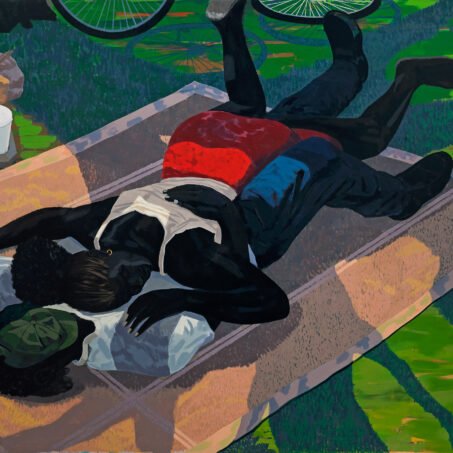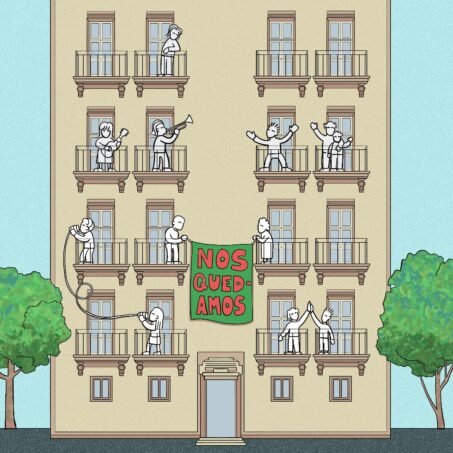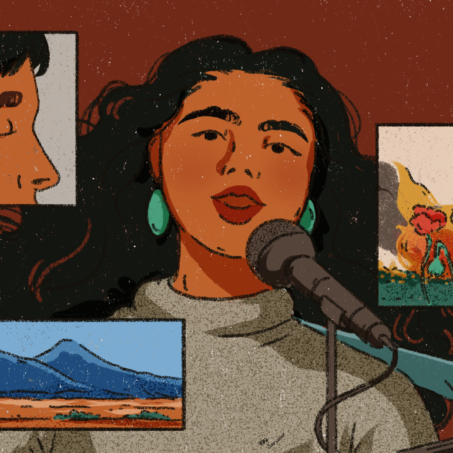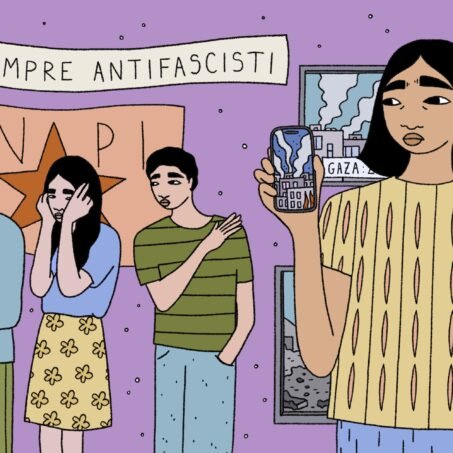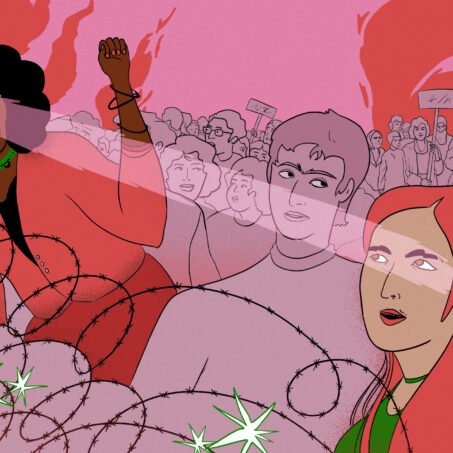During the 20th century, the western music industry benefited hugely from capitalist expansion, a growing international audience and technological advances. Despite the material benefits of producing hits, many artists achieved success through challenging the very system in front of them. Popular music has often had an anti-establishment edge to it: from the anti-fascist folk tunes of Woody Guthrie and ballads of Billie Holiday about the lynching of Black Americans, to the anarchist punk protest songs of Dead Kennedys and revolutionary hip-hop of Public Enemy.
Taking on anti-war music specifically as a theme is illuminating, given that any war is a highly visible and pivotal thing to actively be against. It is easier to rally against a particular war than against a whole system such as capitalism, it gives the anger and outrage a more precise focal point. In the age of globalisation, where American cultural hegemony takes precedence, the focus in popular music has also been on American conflicts. In recent memory, the 2003 invasion of Iraq and the wider so-called ‘War on Terror’ provides a useful case study for how protest music reached new audiences and tried to break out of structural barriers, but still fell prey to forces of mainstream acceptability.

This was a time when the music industry had enjoyed unprecedented success but was quickly running into issues around the advent of digital output. As personal computers and access to the internet became more commonplace, the creation of file sharing networks such as Napster and Limewire threw music company executives into a frenzy to halt the unlicensed transfer of music. The power of the music industry pre-internet relied almost entirely on controlling and distributing physical copies of singles and albums; whether that was records, cassettes or CDs, the commodity was still managed by a few bloated corporations such as Sony, Warner and Universal. The internet came onto the scene with a hedonistic, free-for-all approach, creating a space for popular music to be widely distributed, with amateur artists able to bypass major labels in delivering their songs to the masses.
The music labels pushed back hard against this early phase of internet piracy, often unsuccessfully: it is the nature of the internet to quickly re-group and replace any streaming or peer-to-peer sharing sites which get shut down, a habit easily seen today with torrent servers and dark web markets. Yet the opening of ‘official’ markets, like Apple’s iTunes in 2003, allowed big labels to actually profit off the growing prevalence of digital format music. With Apple legitimising digital downloads and promoting their online store as part of their brand, popular music was still safely paired to major labels, who incorporated Napster’s form of sharing music via online mp3s but with a profit motive.
All of this was against the backdrop of American and, indeed, international musicians mobilising to oppose George W. Bush’s devastation in Iraq and the wider region. Such protest songs spanned a range of genres and effectiveness. One of the better known examples is pop punk band Green Day’s rock opera album American Idiot, with the titular lead single disparaging the President specifically and the state of American society. Singer Billie Joe Armstrong belted out lyrics such as “Don’t want to be an American idiot/ One nation controlled by the media/ Information age of hysteria,” whilst the music video saw the band play in front of a discoloured American flag, where the stripes melted away into green paint.
The single peaked at number three in the UK charts and brought Green Day back from a place of fading relevance in rock. Though the lyrics and imagery are clearly powerful in their own sense, the song does not overtly mention Bush or the invasion of Iraq, only making strong allusions. Its hook means it can be enjoyed as a catchy riff without too much scrutiny, as modern-day Trump fans have done on TikTok, wilfully misconstruing the song as anti-left. It is notable that it was actually Green Day’s other overtly political hit, Holiday, which provided harsher critiques of the war: “Sieg Heil to the president Gasman, bombs away is your punishment/ Pulverise the Eiffel towers, who criticise your government”. There can be a multitude of factors for the lead single’s success over Holiday, but the fact American Idiot became more iconic as a protest song at least indicates that abstract, generalised critiques of war were more palatable to the music establishment at the time.
Moving to hip-hop of the same era, Eminem is a salient example of a popular artist with a history of inflammatory and controversial comments. Though his ire was not reserved for conservatives, his animosity towards the Bush administration was clear, to the point he was even investigated by the Secret Service for anti-government lyrics on the unreleased song We As Americans for the lyric: “I don’t rap for dead presidents/ I’d rather see the president dead/ It’s never been said but I set precedents”.
Eminem’s 2004 single Mosh is another good example of an anti-Iraq war and anti-Bush song which did well. On it, he passionately raps “Let the president answer a higher anarchy/ Strap him with an Ak-47, let him go, fight his own war/ Let him impress daddy that way/ No more blood for oil”, emotionally directing a slew of people to march against the president. However, as the closing of the song and the music video’s climax reveals, Eminem is not suggesting the masses oust the president in a popular uprising but rather vote for Bush’s Democratic Party opponent in the 2004 Presidential Election, John Kerry. This reflects the liberal consensus that Bush’s invasion of Iraq was his fault alone, and electing a Democrat would solve these ails, when in reality 77 Democratic Senators, including Hilary Clinton and current President Joe Biden, voted to authorise the war. It is a sad reality that Kerry could not even bring himself to incisively oppose the occupation of Iraq, indeed he voted for it himself and only critiqued Bush’s handling of the conflict from a strategic standpoint.
I’m not blaming Eminem for viewing politics through the lens of the American two-party system, but his critique of Bush is just that: a critique of Bush as a specific individual responsible for the Iraq War, and not part of a rich culture and history of war that the United States has fostered as a society since its inception. It is an Americanised view, with Eminem calling for American troops to be brought home, but no mention of the countless Iraqi civilians who suffered at the hands of the invasion and occupation, as well as other victims of the ‘War on Terror’ in countries such as Afghanistan, Yemen, Pakistan and Somalia. The call at the end to vote is a perfect encapsulation of conciliatory politics: when one politician is bad we replace them with another candidate, not taking into account the structural apparatus which keeps war an integral part of American foreign policy, regardless of who is in charge at the time.
Music of this era followed mainstream critiques of the invasion which disregarded the foundations of the war industry – cultural destruction and imperialism – only commenting on the circumstantial illegality or mistakes of this particular war. There was no connection made between war and capitalism, nor the US’ tradition of overthrowing governments worldwide. Songs which became successful under the music industry’s restrictions mostly offered abstract anti-war messages or personalised critiques of Bush, with only dynamic artists such as System of a Down breaking through to the mainstream with complex critiques of war. The politics of the 2000s were just as nuanced and potentially radical as they are today, but the means to reach people with a coherent political message of protest was simply more limited. Artists created well meaning but ultimately toothless protest music that did not offer a materialist analysis of conflict, only a blinkered, America-centric view.
A key thing which has changed since this era is the way we consume and share music. In the present day, there are fewer presumptions made about the popularity of certain songs based on radio airplay and charts, metrics which held enormous sway even 15 years ago. Since the height of Bush-era protest songs, YouTube, Soundcloud and especially Spotify have altered the music landscape, and enshrined the redundancy of popular music charts, which were originally a marketing tool more than anything else.
There is also the advent and soaring popularity of social media, which has politicised public life and allowed all art forms to be accessed in an easier way. Music can now be shared without the reliance and limitations of actual physical copies, or even the need to go through ‘legitimate’ markets. Our digital relationship to each other has disadvantages for sure, but it crucially means that anti-war and protest songs can take on a more direct and democratic form. In the last few years, artists like Yungblud and Lowkey have channeled real activism into their music, and vice versa. The conditions of our interconnected world are allowing true anti-imperialist music to come to the fore, which addresses the root causes of war: racism, empire, and ultimately capitalism, without the external pressure of appeasing record labels or pursuing traditional forms of promotion and metrics of success.
Take Chicago rapper Noname as an example. By modern standards her music should be considered mainstream in a sense that she has enjoyed popularity and critical acclaim. Her Instagram and Twitter handles have a large reach, and her Spotify boasts 1.4 million listens per month. By all modern metrics, her jazzy, socially conscious rap is every bit as relevant as Green Day’s pop-punk protest music or Eminem’s anti-Bush tirades were in 2004. The difference is, Noname’s debut album was self-published and released in digital format only. This distinction has given her the autonomy to release music through her own channels, relying on online promotion only. As a self-proclaimed communist and abolitionist, it only seems right that she doesn’t rely on the structures of capitalism for personal gain. Her latest offering Rainforest is a lesson in climate justice and brings forth more intersectional and radical lyrics, such as: “Dyin’ on stolen land for a dollar like that ain’t fucked up/ It’s fuck they money, I’m a say it every song/ Until the revolution come and all the feds start runnin’.” Crucially, Noname also uses her self-made platform to tackle deeper social issues of institutional racism, state-sanctioned violence, imperial exploitation and the patriarchy, even starting a book club of radical readings exclusively from authors of colour and those within the LGBTQI+ community.
Noname’s success in bridging the gap between music and activism is an example of artistry which has transcended the limitations of protest through song. Green Day’s anti-Bush sentiment and other music of the 2000s had important radical elements within it, but the barriers to successful anarchy were limited in scope, bound by technological and social infrastructure which mainly kept the most raw and incisive critiques of war to the underground. With reliance on music label input, traditional marketing techniques and the emphasis on physical commodities gone, people around the globe are more connected than ever in directly accessing grassroots and protest music from Myanmar to Nigeria, allowing a more thoughtful public discourse about radical music to develop. With all the issues that come from social media and permanent connectivity, it is essential that the internet has at least spurred protest music to increase its reach and sharpen its blade, intersecting more effortlessly with the vital work of education and activism.

See more of Ada’s work on Instagram


